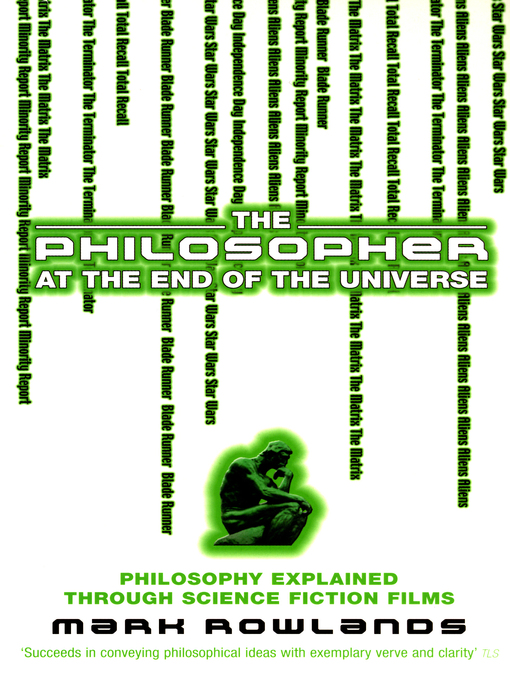'It's Schopenhauer and the will. It's Plato, it's Hume, Baudrillard and the concept of the Nietzschean superman!' Keanu Reeves on The Matrix
The Philosopher at the End of the Universe allows anyone to understand basic philosophical concepts from the comfort of their armchair, through the plots and characters of spectacular blockbusting science-fiction movies. Learn about: The Nature of Reality from The Matrix; Good and Evil from Star Wars; Morality from Aliens; Personal Identity from Total Recall; The Mind-Body Dilemma from Terminator; Free Will from Minority Report; Death and the Meaning of Life from Blade Runner; and much more. As someone once said, things must be said and knowledge known, and the cast list assembled to tell us does not disappoint: Tom Cruise, Plato, Harrison Ford, Immanuel Kant, Sigourney Weaver, Friedrich Nietzsche, Keanu Reeves and Rene Descartes. From characters in the biggest films (with lots of explosions and bad language) to Ludwig Wittgenstein (no explosions and too much language in general), hear all the arguments. I think, therefore... I'll be back!
- Onyx Storm Read- Alikes
- Staff Reads
- In Memoriam 2024
- Cook Up Something Cozy
- Short 'n' Sweet
- Bans off Our Books
- Yo Ho Ho, a Pirate's Life for Me
- Farm to Table
- As If: Modern Books Featuring 80s and 90s Nostalgia
- Wilderness Women
- In My Libby Era: Books for Swifties
- Cowboys and Country Music
- Literary Longlists
- See all ebooks collections
- Full Cast Audiobooks
- Available now Audiobooks
- Just Added Audiobooks
- Pacific Northwest Authors & Settings
- Agatha Christie and Friends
- Books about Books
- Quick Stories
- Uplifting Listens
- Good Enough to Eat
- All You Have to Do Is Call
- Listen to the Great Outdoors
- American History
- Queerly Beloved
- See all audiobooks collections
- News & Politics
- Celebrity
- Health & Fitness
- Food & Wine
- Fashion
- Tech & Gaming
- Business & Finance
- Revistas
- Cars & Motorcycles
- Home & Garden
- See all magazines collections

